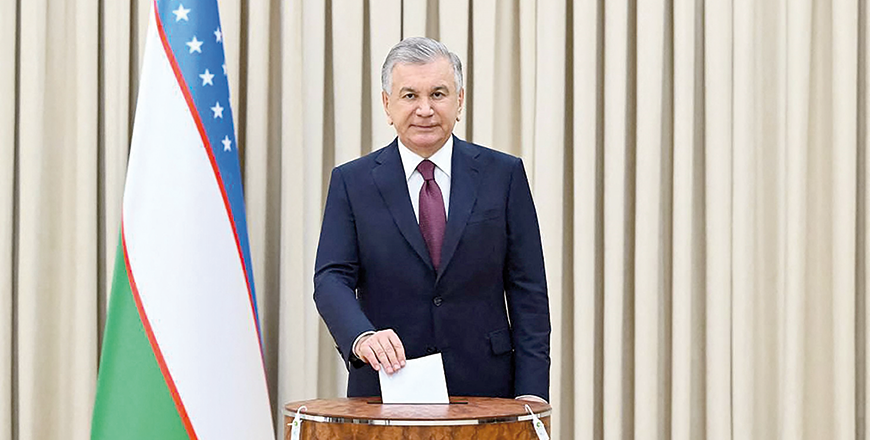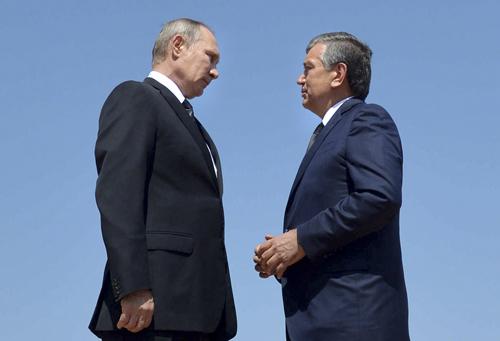You are here
Polls close in Uzbekistan constitutional referendum
By AFP - Apr 30,2023 - Last updated at Apr 30,2023
TASHKENT — Polls closed across Uzbekistan on Sunday, ending a day of voting in the Central Asian nation in a constitutional referendum that could allow President Shavkat Mirziyoyev to remain in power until 2040.
Voting stations closed at 8:00pm (15:00 GMT), after being open for 12 hours. The Election Commission has to announce the result within 10 days.
Mirziyoyev, 65, became president in 2016 after the death of dictator Islam Karimov.
He insists the overhaul of the constitution will improve governance and quality of life in the landlocked Central Asian country of 35 million people, whose rights have long been heavily restricted.
But observers say Mirziyoyev is expected to benefit most in the majority-Muslim country.
The constitutional changes would extend presidential terms from five to seven years, allowing him to serve two more terms and extend his time in power until 2040.
The authoritarian reformer voted in the capital Tashkent with his family.
There is little doubt the amendments will be adopted, in a country where the media is heavily controlled.
Turnout registered at 73.17 per cent seven hours after the opening of polling stations.
The government has gone to some lengths to give the vote a veneer of legitimacy, enrolling local celebrities at large rallies and concerts to praise the proposals and the president.
Billboards around Tashkent, the biggest city in Central Asia, have encouraged people to vote.
The campaign appears to have worked.
“The new constitution will change my life,” Shamsiddin Zhurayev, a 40-year-old businessman, told AFP outside a Tashkent polling station.
“But I don’t really know in what way.”
Yet, the prospect of Mirziyoyev clinging on to power unnerved some.
‘New Uzbekistan’?
“Everything is done so that the president remains in power for life,” said 70-year-old pensioner Nurkhamil, who didn’t give his last name.
He conceded that Mirziyoyev had “made some reforms and tries to change things” but worried that the Uzbek leader is following the footsteps of longtime Russian President Vladimir Putin.
“Our authorities are copying Putin’s system,” he said.
“They [leaders] are not eternal, you have to respect your people.”
Following Karimov’s death, Mirziyoyev spearheaded a series of reforms in Uzbekistan, including a clampdown on forced labour in the cotton fields.
But activists say rights abuses persist, and authorities have shown no sign of allowing a political opposition to emerge.
Last year, at least 21 people died during demonstrations in the autonomous region Karakalpakstan. Rights activists accused the authorities of using lethal force against the protesters.
Olivier Ferrando, a researcher at the Catholic University of Lyon in France, said the reform was a “flagship measure” for Mirziyoyev in his attempt at “emancipation” from the legacy of his predecessor.
Karimov died in 2016 after a quarter-century of brutal rule.
Mirziyoyev was his loyal prime minister for 13 years but now presents himself as a much more progressive figure.
“Many analysts see, understandably, an effort by Mirziyoyev to stay in power but it would be a shame to dismiss this text as just an authoritarian turn,” Ferrando told AFP, referring to the amendments.
Among the proposals are a ban on capital punishment and the protection of human rights for what Mirziyoyev calls a “new Uzbekistan”.
Ferrando said one of the aims of the changes is to “give guarantees to the international community of democratic development in the new Uzbekistan”.
“We will have to see, of course, if this constitutional reform... will be able to go beyond a simple cosmetic effect and be fully implemented in people’s daily lives,” he added.
Bloody protests
Uzbekistan’s population is emerging from a particularly harsh winter marked by shortages of fuel, and is faced with enduring poverty and endemic corruption.
Despite some economic progress and social improvements, such as the criminalisation of domestic violence, the government brooks no dissent.
During the July 2022 unrest, demonstrations against a constitutional amendment in Karakalpakstan, which would have reduced the autonomy of the vast territory, were put down in a bloody crackdown. Dozens of people were jailed.
That controversial amendment has since been withdrawn.
Related Articles
TASHKENT — Uzbek President Shavkat Mirziyoyev won a third term that will keep him in charge of the tightly controlled country until 2030 as
ALMATY, Kazakhstan — Uzbekistan's parliament approved Prime Minister Shavkat Mirziyoyev as acting president on Thursday, a government websit
His Majesty King Abdullah on Thursday sent a cable to Uzbekistan President Islam Karimov congratulating him on assuming his constitutional powers as president.

















